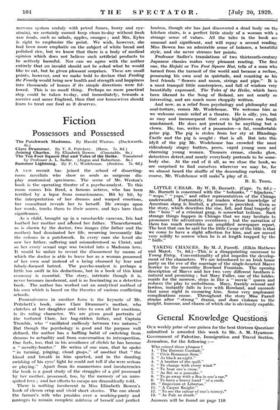Fiction
Possessors and Possessed
The Ten Foot Square Hut and Tales of the Heike. Translated A NEW recruit has joined the school of dissecting- room novelists who show us souls as surgeons dis- play anatomical specimens. The scene of Mr. Weston's
book is the operating theatre of a psycho-analyst. To this room comes Iris Reed, a famous actress, who has been
terrified by a lapse from consciousness. Bit by bit, by the interpretation of her dreams and warped emotions, her consultant reveals her to herself. He swoops upon her words, tracks them to their source, and lays bare their significance.
As a child, brought up in a ramshackle caravan, Iris had loathed her mother and adored her father. Thenceforward, as is shown by the doctor, two images (the father and the mother) had dominated her life, recurring incessantly like the colours in a patchwork. In every man she loved she saw her father, suffering and misunderstood as Christ, and so her every sexual urge was twisted into a Madonna love. It would be unfair to reveal the denouement by means of which the doctor is able to leave her as a woman possessed of her own soul instead of a being obsessed by fear and falsely-focused hatred. The psycho-analyst is perhaps a little too swift in his deductions, but in a book of this kind economy is essential. The story, intricate though it is, never becomes incoherent, and is as fascinating as a detective book. The author has worked out an analytical method of his own which is based on the theories of various conflicting schools.
Possessiveness in another form is the keynote of Mr. Pritchett's book, since Clare Drummer's mother, who clutches at her daughter and tries to own all her emotions, is its ruling character. We are given good portraits of the tortured Clare, her hag-ridden father, and Captain Tremble, who " vacillated endlessly between two natures." But though the psychology is good and the purpose well defined, the author has a baffling habit of switching from - dreams to actuality and from conversation to introspection. One feels, too, that in his avoidance of clichés he has become a novelty-hunter." Be writes of one man, that he spoke '" in turning, pinging, cloud gasps," of another that " the blood and breath in him spurted, and in the dazzling swishing of his eyes' light he could not tell if she were serious or playing." Apart from its mannerisms and incoherencies the book is a good study of the struggles of a girl possessed by her mother, possessed, too, by the memory of an unre- quited love ; and her efforts to escape are dramatically told.
There is nothing incoherent in Miss Elizabeth Bowen's book of eleven crisp and vivid short stories. The one about the farmer's wife who presides over a working-party and manages to remain complete mistress of herself and perfect
hostess, though she has just discovered a dead body on the kitchen stairs, is a perfect little study of a woman with a strange sense of values. All the tales in the book are unusual and significant, and will repay a second reading. Miss Bowen has an admirable sense of balance, a beautiful style, and she never stresses her points.
Professor Sadler's translations of two thirteenth-century Japanese classics makes very pleasant reading. The first one, the Hojoki or Ten Foot Square Hut, tells of a man who turned from the turmoil of the world and became a recluse, possessing his own soul in quietude, and counting as his best friends " flowers and moon, strings and pipe." It is a most tranquil little masterpiece, and full of wisdom very beautifully expressed. The Tales of the Heike, which have been likened to the Song of Roland, are not nearly so interesting, and are much more choppily written.
And now, as a relief from psychology and philosophy and soul-torture, comes Mr. Wodehouse. We welcome him as we welcome comic relief at a theatre. He is silly, yes, but so easy and inconsequent that even highbrows can laugh unashamed. He does not pretend to be anything but a clown. He, too, writes of a possession—a fat, comfortable prize pig. The pig is stolen from her sty at Blandings Castle and the pig is sought : that is all. But into this idyll of the pig Mr. Wodehouse has crowded the most ridiculously stagey butlers, peers, vapid young men and charming young women. Trousers crease, cheeks glow, detectives detect, and nearly everybody pretends to be some- body else. At the end of it all, as we close the book, we are surprised to find ourselves wherever we may be, for we almost heard the shuffle of the descending curtain. Of course, Mr. Wodehouse will makg.a play of it.
B. E. TODD,
















































 Previous page
Previous page